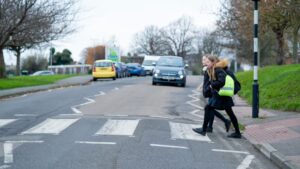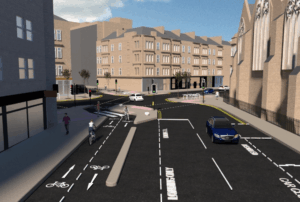A cross-sector group, led by Sustrans, urge the UK Government to protect £4 billion multi-year active travel investment to ensure economic growth, worth £36.5bn (2021).
Sustrans has joined together with other organisations representing active travel, motoring, road safety, the environment and business leaders to issue urgent recommendations to Government.
The organisation’s called for the Government to protect the £4billion funding pot which is earmarked to help ‘level up’ walking and cycling across the country.
They have written to the Secretary of State for Transport, Anne-Marie Trevelyan MP, to emphasise the vital contribution of walking and cycling to the UK’s urban and rural economic growth and to society.
Click here to read the letter to the Secretary of State
“This comes after the launch of our brand new report which highlights that walking, wheeling and cycling generated £36.5billion for the UK economy in 2021,” said Sustrans.
This is based on the direct economic benefits of walking and cycling as well as others such as reducing the cost of traffic congestion and running a car, improved health and reduced burden on the NHS, and fewer sick days at work.
The letter has been signed by:
- members of the Walking and Cycling Alliance
- the AA motoring organisation
- CPRE
- Brake
- the Road Safety Foundation
- the Urban Transport Group
- and the Federation of Small Businesses (FSB).
It calls for the protection of funding for cycling and walking, already committed in the second Cycling and Walking Investment Strategy 2022.
It is crucial that this money is ringfenced in order to foster aspirations for growth and to support people through the cost of living crisis, said Sustrans.
Xavier Brice, Sustrans CEO said:”It’s clear that active forms of travel, such as walking and cycling, bring in billions of pounds of economic benefit.
“Plus, as people are hit by the cost of living crisis, affordable ways of getting around are critical. People must have the opportunity to make the active travel choice instead of expensive car use, to boost people’s spending power for the benefit of the economy and our hopes of growth.”
Sustrans’ Walking and Cycling Index, showed that in 2021 walking, wheeling and cycling created £6.5billion in economic benefit across the 17 urban areas surveyed.
Extrapolated UK-wide, this equates to an overall annual benefit of £36.5billion.
People who walk to the high street spend up to 40% more than those who drive, whilst physically active people take 27% fewer sick days each year than their colleagues.
Cycling and walking infrastructure unlock housing developments giving people more choices in how they travel and connecting them to work and education.
Edmund King OBE, AA president said: “Every driver is a pedestrian and most cyclists are drivers, therefore it is in everyone’s interest to level up walking and cycling infrastructure.
“By creating new routes, as well as investing in existing paths and footways, we can create a safer, greener transport network that benefits all road users. Maintaining the £4bn budget for these projects will also help drivers save money on fuel or electricity.
“When we ask AA members what mobility modes they would consider replacing one or more car journeys per week, the top answer was bicycle (47%), followed by e-bikes (41%).”
National Chair of the Federation of Small Businesses (FSB), Martin McTague, said: “To make the country healthier, reduce the reliance on energy and fuel and move towards Net Zero, new Ministers must look across the board at active travel.
“This should include infrastructure improvements and reforming schemes like Cycle To Work, so they operate as well for small employers and the self-employed as they do for larger firms.”
Sarah Mitchell, CEO of Cycling UK said: “As the cost of living hits us hard, everyone is looking to save money wherever they can.
“Many are turning to cycling for those shorter journeys – whether to work, school or the shops – that are essential for the UK’s growth agenda.
“It is essential that funding for cycling and walking is, at the very least, maintained at the current level of investment if we are to keep the nation moving and deliver the government’s own active travel strategy.”
At the height of the pandemic in 2020, the National Cycle Network alone carried 4.9 million users over 764.8 million trips, showing massive public reliance on walking and cycling infrastructure.
This also plays a vital role in supporting the Government’s aim of 50% of all journeys in towns and cities walked or cycled by 2030, on the path to achieving Net Zero.
The call comes as the cost of living crisis is exposing people on low incomes to transport poverty.
This is the cause of social isolation, financial debt, and an increasing gap in the economic sectors of society.
Xavier Brice added: “It is high time we stopped pitting motoring against walking, wheeling and cycling.
“We must instead realise the benefits that long-term Government investment for active travel can have for economic growth and to support people on low incomes through the cost of living crisis.”
Find out more about our recommendations and download the report.























